Growing the World’s Packaging with Mycelium
In a world reimagined by S.Lab, a Ukrainian startup, packaging can be left to the fungi. By growing mycelium within agricultural waste, the company produces a durable, biodegradable alternative to plastic.
Julia Bialetska steps back from the production line and lets the fungi perform their magic. The mycelium (a network of mushroom roots) feasts on local agricultural waste, and the tiny fibres intertwine, forming networks with more connections than the human brain.
S.Lab, co-founded by Julia, creates durable, biodegradable packaging from mycelium. “We give it five days to grow. Mycelium starts to create nets like a spider, binds the plant waste particles together and fills all the empty spaces,” she says, describing the process.
Thanks to the diligence of the mycelium, the packaging moulds become filled with a waterproof, durable, thermal-insulating and natural material that can be used to replace foam plastic or polystyrene. Perfumes, electrical devices, and pharmaceuticals are just some of the many products their packaging protects.
“The best part is that it can be thrown anywhere, and it biodegrades in 30 days without any trace or any leftovers,” Julia says. The bacteria in the soil do all the work.
The mycelium solves a pressing need; right now, plastic packaging and polystyrene flood our landfills and overwhelm our oceans, taking hundreds of years to break down. Polystyrene, Julia points out, doesn’t actually biodegrade. In fact, more than 15 million tonnes of polystyrene are produced annually, but less than 10% of all plastic is recycled.
The true horror of this fact hit her back in 2017, when she was living in Bali, working remotely in a senior managerial position, along with her husband. Out surfing one day, she encountered a deeply unsettling sight. “Instead of a beautiful ocean and beautiful beach with sand, I saw huge mountains of plastics.”
As a child, she’d grown up frequenting the rich, biodiverse woodlands of Rivne, her hometown in Ukraine. “I remember clean rivers. I remember clean seas. This is how I was raised, and this was my perception of nature: that it is clean and not polluted,” she says.
Seeing Bali’s beaches triggered something deep inside for Julia – a fundamental inner conviction that this was not how nature was supposed to be. Her mind started whirring, “Is there anything I could do to change this?”
“I don’t want to dwell on people who are not taking care of nature, I want to be the person who is making the change,” she decided. Julia started a five-year journey with her husband and co-founder, Eugene Tomlin, to create an alternative packaging material. Armed with a Master’s degree in biotechnology, she not only had a background in academic research but also a career in the software industry, which helped develop the original product and found the company.
Discovering the strength of hemp fibres was a turning point. “When we found that mycelium could be our binding component, we went to the botanical institute, explained our idea, and they grew the parent culture we are still using till this date.”
They settled in Ukraine in 2020, where their connections in the environmental space formed fertile ground for the seeds of S.Lab, short for Sustainable Lab, to sprout in 2021. The pandemic had also helped spur interest in S.Lab. “Everyone was so tired of the amount of packaging they were receiving during the pandemic, and it was all piling up in their houses.”
Nevertheless, they had to contend with existing prejudice against eco-materials. “We are asked so many questions. Why does it smell? Why doesn’t it have any smell? Everyone is so used to fossil-fuel-based material that they don’t ask questions.”
“You have to change a bit, maybe your process, maybe your perception. You have to get rid of this concept of shiny plastic,” she says. For S.Lab, 2021 ended on a high note, with an incoming first investment and talks with large corporations for production.
That is, until the unthinkable happened.
I don’t want to dwell on people who are not taking care of nature, I want to be the person who is making the change.
“One day it all changed,” reminisces Julia. “First, we had to save ourselves.” The war with Russia had started - they had to flee the country.
They chose Spain as their home to restart S.Lab, partly due to EU regulations that incentivise companies to use alternative, sustainable materials. “We wanted to continue all of this work because we knew that what we do is something that is needed,” she says. “Everything was taken from us. We had just ourselves, some of the samples, and we had to find a new space to produce. We had to go to new markets. We didn't even speak the language.”
Thanks to European conferences and help from sponsors eager to support Ukrainian companies, they were able to establish a secure base. So far, they’ve raised over €1M in investments and are working to collaborate with international corporations.
Julia also won the EIT Women Leadership Award from the European Innovation Council in 2024. “I actually feel proud every day when I wake up and I have the honour to work on S.Lab with my team, co-founder and customers,” Julia says.
They’ve now developed the technology to produce their packaging at an industrial scale. Their next aim is to create a decentralised, mycelial network of mini-factories globally that could utilise local agricultural waste to produce natural packaging, making it cheaper and more accessible.
“Once we can see the products in the grocery store, packed into S.Lab packaging, we can say that we were here, that our mission is really done.”
Most Popular
The Climate Tribe delivers stories about Biodiversity and Conservation, Circular Economy, Food and Water , and how they intersect with climate.
Subscribe
Get the latest stories inspiring climate action around the globe straight to your inbox.






